The rapid rise of artificial intelligence promises to transform many aspects of life, from education and work to personal connections. Over the next 20 years, AI advancements will continue. But whether this leads to excitement or concern or brings more benefits than harm is highly debated.
This chapter examines how the American public and experts anticipate AI’s impact across key areas in the coming decades.
How will AI impact the U.S. over the next 20 years?
There are many predictions for what AI may bring. However, the public and experts don’t see eye to eye on the type of impact AI will have on the country.
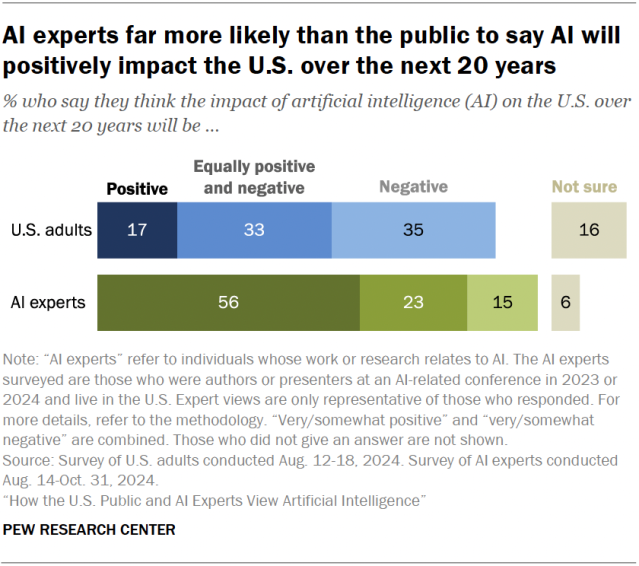
Fully 56% of AI experts surveyed say AI will have a very or somewhat positive impact on the United States over the next 20 years. This compares with 17% among the general public.
Conversely, 35% of U.S. adults believe AI will negatively affect the country over the next two decades, compared with 15% of experts.
The public is also more likely than experts to say that AI’s impact on the U.S. will be equally positive and negative (33% vs. 23%) or that they’re unsure (16% vs. 6%).
By gender, among AI experts surveyed and U.S. adults
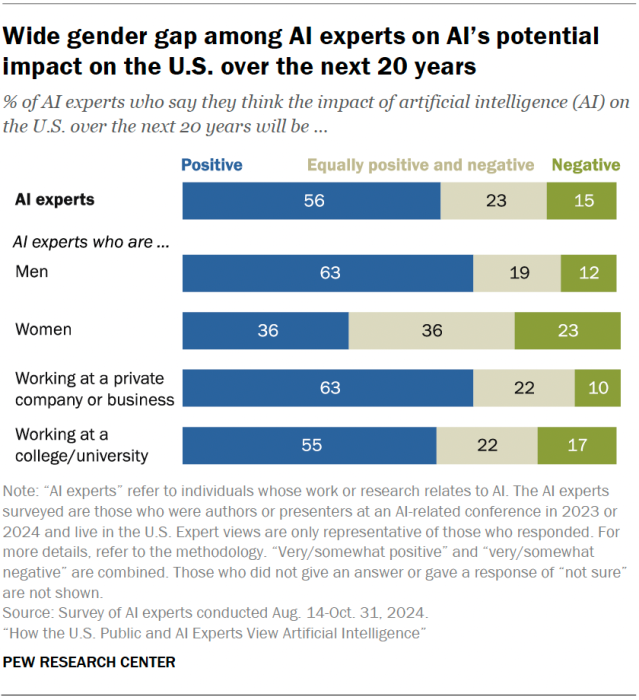
There are substantial gender differences among experts on AI’s potential impact on the country.
Among AI experts surveyed, men are far more likely than women to say AI’s impact would be positive (63% vs. 36%).
Female experts are more likely than their male counterparts to predict negative outcomes (23% vs. 12%) or to foresee an equal mix of both (36% vs. 19%).
Gender gaps are also present among U.S. adults, but they are far more modest than the differences seen among experts.
Among all adults, 22% of men say AI will have a positive impact on the U.S., compared with 12% of women. (Refer to Appendix B for more details on how views vary by demographic groups.)
By job sector, among AI experts surveyed
We also explored experts’ views by job sector. About six-in-ten experts surveyed who work for a private company or business (63%) believe AI’s impact on the U.S. will be positive. Among those who work at a college or university, that share is 55%.
AI’s impact on elections, education, jobs and health care
Our survey examined public and expert opinions on AI’s impact across 10 specific sectors, revealing areas of disagreement and alignment.
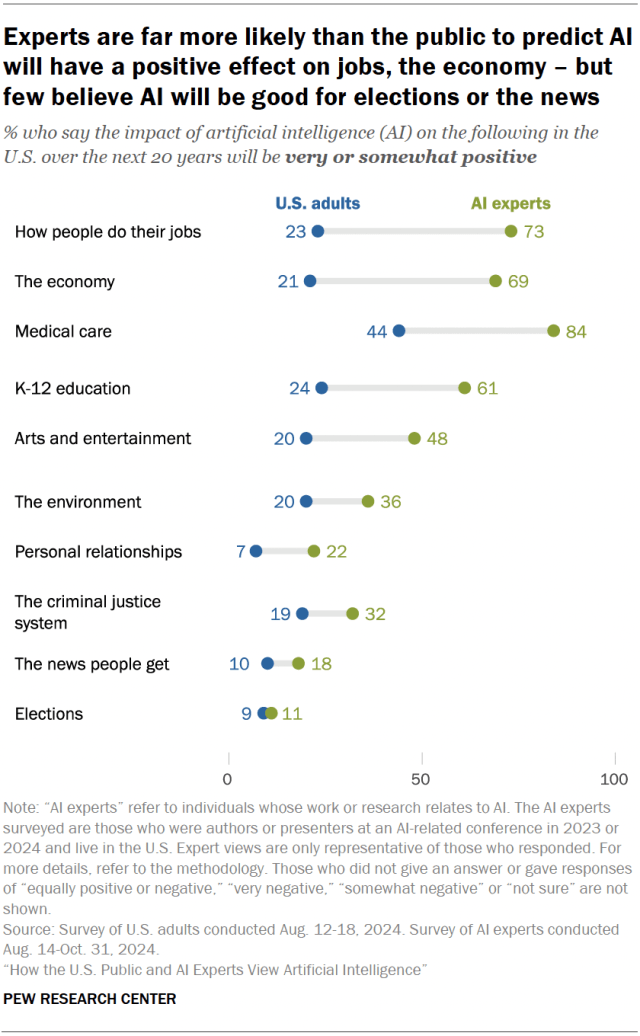
The starkest differences between experts and the public are about AI’s influence on work and the economy. AI experts surveyed are far more likely than the general public to believe that over the next 20 years, AI will have a very or somewhat positive impact on how people do their jobs (73% vs. 23%) or the economy (69% vs. 21%).
Views also vary widely on AI’s impact on health care, education and the arts. Even as medical care is the one area in which the public is most optimistic about AI’s impact, experts are 40 percentage points more likely than the general population to believe it will positively affect medical care (84% vs. 44%).
AI experts are also more likely than the public to think this technology will benefit K-12 education (61% vs. 24%) or arts and entertainment (48% vs. 20%).
Still, some areas show more common ground, notably elections and news. AI experts and the public are both wary of AI’s role in politics and journalism. Just 11% of experts surveyed and 9% of the public believe AI will positively impact elections in the U.S. over the next 20 years. In fact, 61% of these experts believe AI will harm elections in the future, with 50% of the public saying the same.
News is also an area where small shares of experts (18%) and the public (10%) believe it will be a good thing for the country. About half or more of experts (56%) and the public (51%) predict it will negatively affect the news people get.
It’s also worth noting that the general public is generally more unsure of their predictions. For example, about a quarter of U.S. adults say they are not sure of the type of impact AI will have on the criminal justice system (28%), personal relationships (24%) or elections (23%).
By gender, among AI experts surveyed
There are sizable gender differences among experts in their views about AI’s impact on certain aspects of society. For example, 68% of male experts surveyed say AI’s impact on K-12 education over the next 20 years will be very or somewhat positive, compared with 42% of female experts.
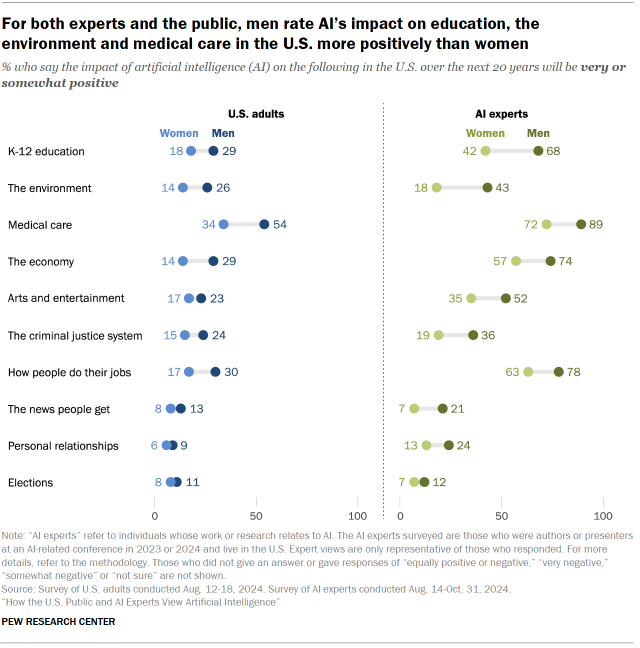
Among AI experts, men are also more likely than women to say AI will lead to positive outcomes for the environment (43% vs. 18%), medical care (89% vs. 72%) and the economy (74% vs. 57%), for example.
By gender, among U.S. adults
While the public is less confident than experts about AI’s potential positive impact on the country, there are also gender differences among U.S. adults overall.
Men are consistently more optimistic than women regarding AI’s potential over the next two decades, particularly in medical care (54% vs. 34%). Larger shares of men than women say AI will benefit other areas, like how people do their jobs and the environment.
There is agreement on AI’s impact on elections, with only about one-in-ten men and women saying it will have a positive effect.
Will AI lead to fewer jobs?
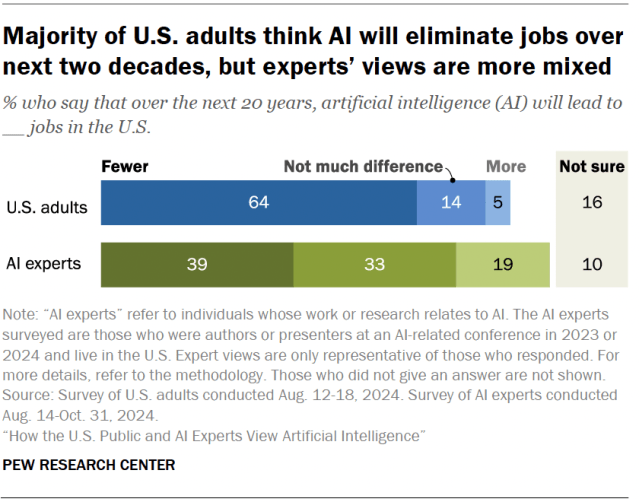
We’ve seen anxiety in our prior work around AI and jobs both among the public and workers. Our current survey finds this sentiment is more widely held among the general public than among AI experts.
Overall, 64% of U.S. adults say that over the next 20 years, AI will lead to fewer jobs in the U.S., while just 5% think it will lead to more jobs.
And more than one-in-ten say it either won’t make a difference (14%) or that they’re unsure (16%).
AI experts’ opinions are more mixed. Roughly four-in-ten (39%) foresee fewer jobs due to AI over the next two decades. A smaller share (19%) believes it will lead to more jobs. And one-third think it will not make much of a difference.
Quotes from AI experts: Future of work
“I’m excited about further automation of code, even though a lot of my job is software engineering, so that’s in competition with my job. I am excited about making the process even simpler than it is right now. In general, I think of AI as helping people along jobs. So, I think of the biggest outcome is automation of processes that feel very slow and feel like they don’t necessarily require full brain power, being automated by AI.”
Impact of AI on certain occupations
The emergence of AI has led to debate over its impact on occupations. Some expect industries such as manufacturing to be more affected by AI. But advances in generative AI suggest that fields that have required advanced degrees, like law or engineering, may also see major impacts.
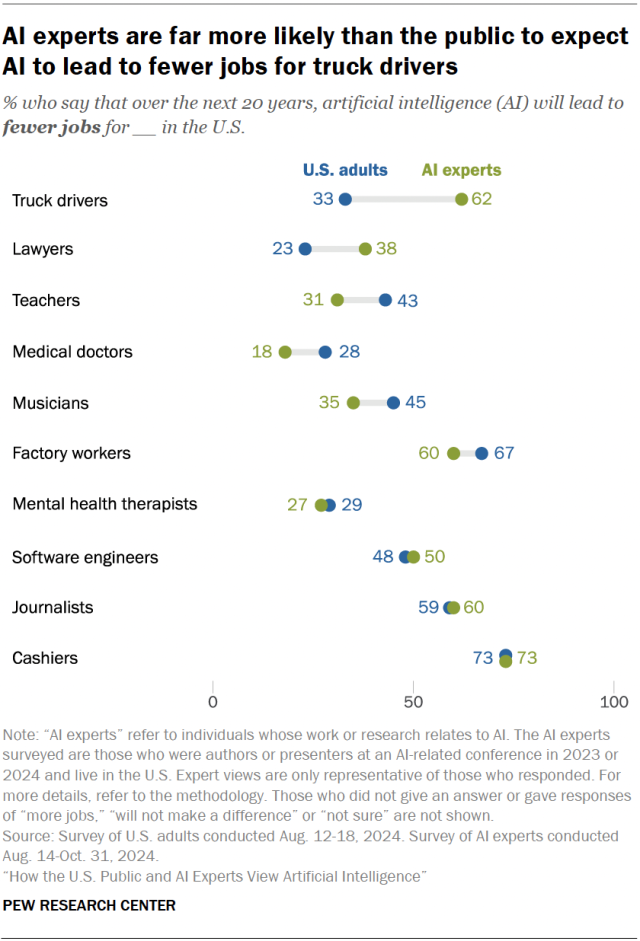
Our surveys show that the public and AI experts think that certain jobs are more at risk than others. For example:
Cashiers, factory workers: 73% each of the general public and AI experts surveyed think AI will lead to fewer cashier jobs over the next 20 years.
And among both experts and the public, six-in-ten or more think AI will lead to fewer factory worker jobs over the next 20 years.
Journalists: Journalism is another occupation exposed to automation. About six-in-ten of the general public (59%) and AI experts (60%) also say AI will lead to fewer journalist jobs over the next 20 years.
But views diverge about truck drivers: Experts are far more likely than the general publicto say AI will lead to fewer truck driver jobs over the next 20 years (62% vs. 33%).
Quotes from AI experts: Job loss
“[AI] is going to take over a lot of jobs. Of course it’s creating new jobs, but that doesn’t mean it’s matching that. We’re generating maybe 10 jobs, but at the same time, we’re taking away 1,000 jobs. For example, truck drivers, they’ll be gone in 10, 20 years probably, if you think. Are we going to replace them? What are they going to do?”
The public is more pessimistic about medical doctors and teachers than AI experts. For example, 43% of adults overall say AI will lead to fewer teacher jobs in the next 20 years, compared with 31% of experts. This pattern is similar when asked about medical doctors.
AI experts are more pessimistic about legal fields: 38% of AI experts say AI will lead to fewer jobs for lawyers, while 23% of the general public agrees.
The public is generally more likely than AI experts to say they are unsure about AI’s impact on the number of jobs in these industries. For instance, about one-in-five or more U.S. adults say they are unsure of the type of impact AI will have on mental health therapists (26%), truck drivers (21%) or journalists (19%).
Will AI be able to think on its own?
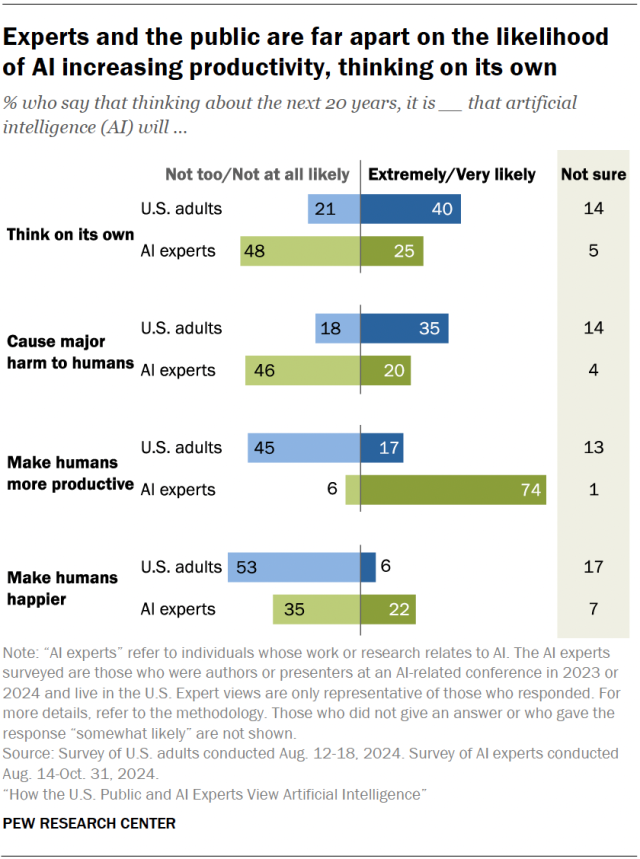
Our survey also asked people to predict AI’s impact more broadly – from its ability to enhance productivity to AI eventually thinking independently.
Experts and the public are far apart on AI’s potential impact on human productivity: 74% of AI experts surveyed think it’s extremely or very likely that AI will make humans more productive over the next 20 years, compared with 17% of the general public.
There are also differences in views about AI developing independent thought: 40% of U.S. adults believe this will be possible in the next 20 years. There is more skepticism among AI experts surveyed, of whom about half – 48% – say this is unlikely to happen.
The belief that AI will cause major harm to humans is more common among the public than AI experts. U.S. adults are more likely than experts to believe AI will cause major harm to humans (35% vs. 20%). Meanwhile, 46% of experts say this is unlikely, compared with 18% of adults overall.
Few U.S. adults or experts think AI will make humans happier. Just 6% of Americans overall believe it is highly likely that AI will make humans happier. About half say this is unlikely.
Experts, too, are skeptical. Larger shares believe this is unlikely rather than likely to happen (35% vs. 22%).
Quotes from AI experts: AI, productivity and intelligence
“I wouldn’t say [AI] is the biggest technological revolution we’ve had … nonetheless …, in terms of improving productivity, it is incredible. But in terms of what some people expect AI to be, … ‘This is now an artificial general intelligence, like human intelligence,’ we are not there yet. The hype shouldn’t be that, right? But in terms of improving productivity levels, yeah, then it is a very good product.”
Could AI be trusted with important decisions?
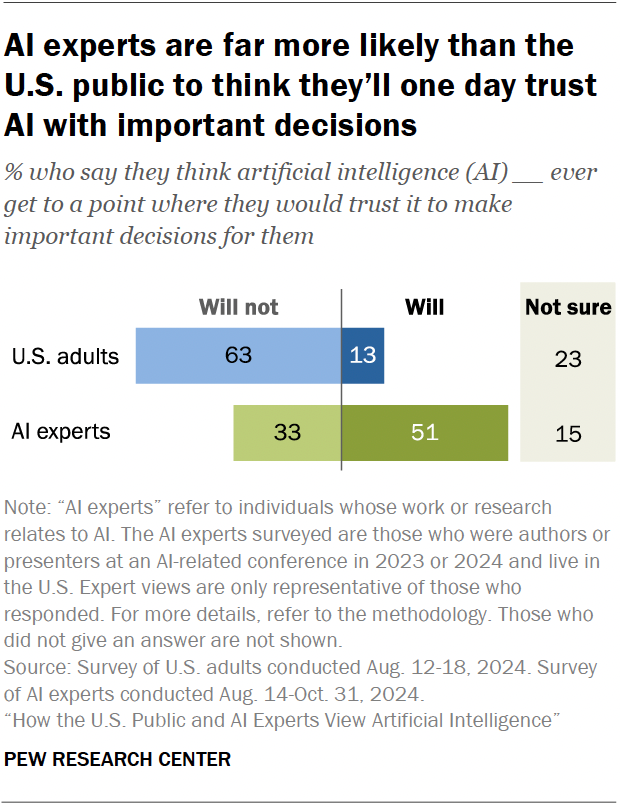
AI experts are far more likely than the public to anticipate eventually trusting AI with important personal decisions.
The majority of U.S. adults (63%) say AI will never get to a point where they would trust it to make important decisions for them. Just 13% think it will.
The experts we surveyed are more positive. Roughly half think AI will one day get to a point where they’d trust it for these types of decisions.
By gender, among AI experts surveyed and U.S. adults
Men are more likely than women to say they’d trust AI to make such decisions for them. This is true for AI experts (58% vs. 30%) and the public (18% vs. 9%) – though relatively few U.S. adults say this, regardless of gender.




